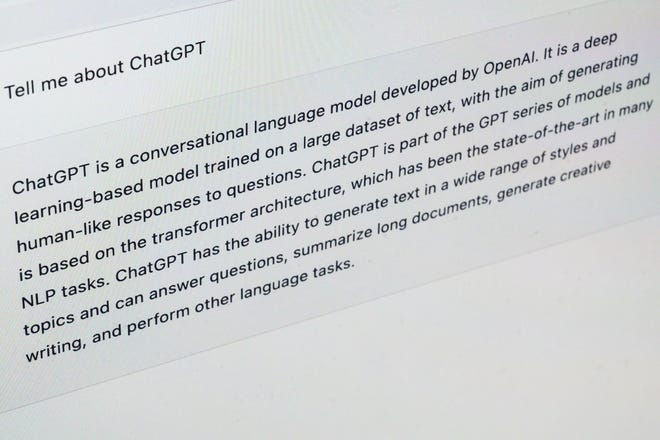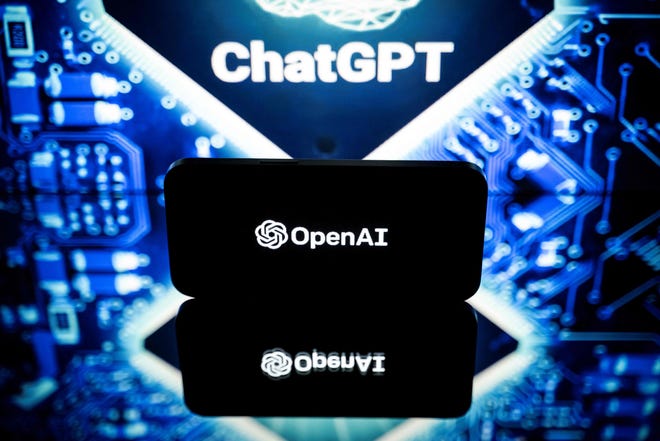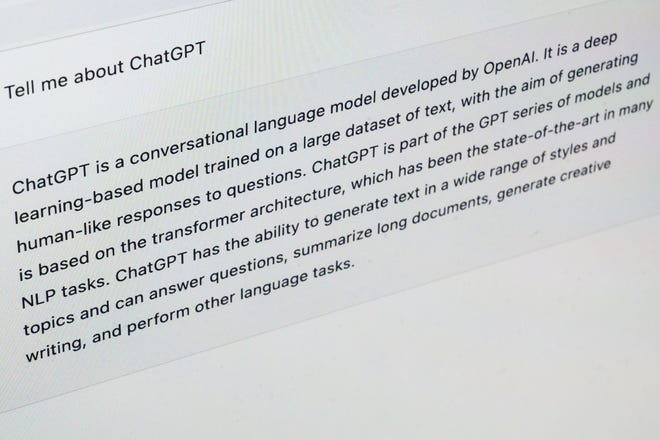[ad_1]
Despite concerns about whether students are using ChatGPT to cheat on exams or as a shortcut to doing their coursework, a new national survey shows students and teachers have quickly incorporated the new technology into their every day lives.
Laila Ayala, a student at Comp Sci High in New York City, for instance, has used ChatGPT to research prompts for her debate team on the effect of AI on students, student mental health and whether the SAT and ACT should be abolished. In Kentucky, high school junior Zachary Clifton said he’s used ChatGPT to create study guides for some of the college courses he takes at a nearby community college.
Even as some school districts ban the artificial intelligence platform – which can quickly answers questions about nearly any subject it’s asked – and some college professors find themselves becoming hypervigilant about whether students are using it to cheat, the new survey commissioned by the Walton Family Foundation and conducted by Impact Research found 22% of students use the chatbot to help them with coursework or in extracurricular activities “on a weekly basis or more.”
And more than half of teachers surveyed reported using ChatGPT at least once since its release, with 40% of teachers using it “at least once a week.”
What is ChatGPT?Everything to know about OpenAI’s free AI essay writer and how it works

The nationally representative survey results, shared exclusively with USA TODAY, involved more than 1,000 teachers and another 1,002 12- to 17-year-olds.
What does the research show?
The survey, conducted in early February, also found 63% of students and 72% of teachers agreed with the sentiment that ChatGPT is “just another example of why we can’t keep doing things the old way for schools in the modern world,” and 73% of teachers said the the tool “can help students learn more.” The Walton Family Foundation supports companies that produce artificial intelligence platforms and products.
Other surveys, however, capture teachers’ apprehension about artificial intelligence. One survey of 203 K-12 teachers from Study.com found that more than 70% of teachers “have not received any faculty guidance on ChatGPT,” 43% of teachers “think ChatGPT will make their jobs more difficult” and about 1 in 4 teachers have caught a student using ChatGPT to cheat on assignments.
Another survey by the online magazine Intelligent found 30% of college students used ChatGPT on written assignments and 60% of that group used it on “more than half of their assignments.”
Romy Drucker, a director of the education program at the Walton Family Foundation, said the organization commissioned its survey to understand what students and their teachers want from their education, especially during the urgent need to help students make up for learning time lost during remote schooling triggered by the pandemic.
“With this research we’re hoping to cast a light,” said Drucker, adding that teachers and students should have a voice in the how ChatGPT and AI is used in their classrooms.
How are teachers and students using ChatGPT?
Harried teachers are using the tool to help write emails to parents, create lesson plans and even devise math problems.
“I think teachers are ahead of students in thinking about how ChatGPT and AI can be both a support to teachers and something more,” Drucker said.
Diego Marin, an eighth grade math teacher in Illinois, said he uses ChatGPT to craft multiple-choice questions and as an assistant for lesson planning and interacting with students’ families.
Marin said he’s not concerned about students using the platform to cheat in his class because of the subject he teaches, but he’s told his students about his expectation that they use the platform ethically.
Catch them in the act:OpenAI launched a second tool to complement ChatGPT – and help teachers detect cheating
In Texas, eighth grade English teacher Patrick Powers said he’s allowed students to use ChatGPT for debate topics and mock business proposals, but he said he recommends teachers learn a student’s writing voice before allowing them to use the platform. Students need new ways to learn, he said, and teachers should adapt to new tools rather than fearing them.
“Due to the pandemic, students are just behind, and they need fresh, innovative methods to be interactive,” Powers said. Both teachers said some of their colleagues are starting to learn more about ChatGPT and use the platform in their courses, too.
New concerns emerge about ChatGPT
Plenty of school leaders remain concerned about the platform’s threats on academia.
When the chatbot launched in November, school districts, teachers and professors were worried about students using the tool to plagiarize and cheat.
The worry remains, and has expanded.
‘This shouldn’t be a surprise’:The education community shares mixed reactions to ChatGPT

For example, there are growing concerns about how AI could influence test scores. The chatbot has passed many high-level exams, including the Wharton MBA Exam, US medical licensing exam, exams in several law classes and a final at Stanford Medical School, Business Insider reported.
Other issues with ChatGPT and similar AI technology involve its cultural competency. Microsoft has come under fire for its Bing AI chatbot, which has offered derogatory ethnic slurs, among other concerns.
Ayala, 16, said she is worried about how the information presented by the bot could contribute to “systematic racism in America,” given other AI-based technology has shown a racial bias.
“I think that with ChatGPT, everything has its benefits and its downsides.”
Contact Kayla Jimenez at [email protected]. Follow her on Twitter at @kaylajjimenez.
[ad_2]
Source link
